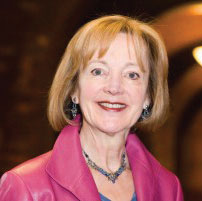[vc_row][largura da coluna_vc=”1/1″][vc_column_text]
The Nexus of Development and Citizen Diplomacy
[/vc_column_text][/vc_coluna][/vc_row][vc_row][largura da coluna_vc=”2/3″][vc_column_text]
My first meeting with Charito Kruvant, legendary founder of Creative Associates International, occurred in 2006. Naquela hora, Jerrold Keilson, Creative’s Vice President for Business Development, made the introduction. Jerrold served on the board of the National Council for International Visitors (NCIV). I was NCIV’s President.
NCIV is a national network of 94 community organizations throughout the United States, national program agency members, associate members, e indivíduos. NCIV is the private sector partner to the U.S. Department of State for the administration of the International Visitor Leadership Program (IVLP). Our members have an unmatched capacity to organize professional appointments, cultural activities, and home visits for the foreign leaders chosen by U.S. Embassy personnel abroad to participate in the IVLP. Striving to be the international gateways to their communities, NCIV members host IVLP participants – professionals ranging from members of Parliament to editors of newspapers – as well as participants in other exchange programs. They have diverse portfolios that include protocol services, speaker programs, and language banks. Each year approximately 80,000 volunteers are involved in NCIV member activities.
NCIV’s mission is to promote excellence in citizen diplomacy – the concept that the individual has the responsibility to shape U.S. foreign relations, as our members phrase it, “one handshake at a time.” With our small staff in Washington, DC tapping both outside experts and exemplary network leaders, NCIV provides various training and networking opportunities for our members. These services include national and regional conferences, subvenções, and publications in pursuit of three major goals. NCIV strengthens our members’:
- Leadership and nonprofit management abilities;
- Capacity to produce culturally and politically sensitive U.S. experiences for participants in both professional and youth exchange programs; e
- Advocacy efforts to build long term relationships with the members of the U.S. Congress and their staffers to assure adequate resources for U.S. Department of State exchanges specifically and the 150 Account in general.
Not long into my first conversation with Charito, it was clear that the work of Creative and NCIV was remarkably complementary. Our missions overlapped. We decided to combine forces. Creative became a corporate partner for NCIV – a primary sponsor for NCIV’s annual Breakfast on the Hill. Creative’s government affairs staff served as panelists for NCIV’s advocacy training. NCIV has helped promote Creative Learning’s “Unofficial Ambassadors” Programa, which sends Americans to volunteer in Muslim majority countries as a way of providing service, building people-to-people relationships, and creating a solid foundation for peace and partnership.
Although Creative’s personnel may not think of themselves as citizen diplomats, their actions clearly shape others perceptions of the United States. These perceptions are critically important. They determine whether colleagues abroad buy the products and services of U.S. empresas, travel to U.S. tourist destinations, or send their students to U.S. colleges and universities. They influence the ability of our diplomats to elicit cooperation in tackling unprecedented global programs that range from preventing epidemics to preserving scarce water resources.
Those working on the front lines of development and foreign assistance are citizen diplomats. Citizen diplomats at home, such as those active in the NCIV network, are a vital domestic constituency for U.S. constructive international engagement – the exercise of what Harvard Professor Joseph Nye describes as “smart power” – that unique mix of hard (military power) and soft power (diplomacy, desenvolvimento, exchanges) that maximizes a nation’s influence.
In a recent article, “America at a Global Crossroads,” Frank Carlucci (Reagan’s National Security Advisor), Lee H. Hamilton (retired Democratic Congressman and Chair of the 9/11 Commission), and Tom Ridge (Homeland Security Secretary under President George W. Bush) argue that it is in America’s national interest to support smart investments in development and diplomacy. They state: “Com quase 95 percent of the world’s consumers living outside of the United States, we will lose our competitive edge if we do not engage in the global marketplace.”
Jerrold Keilson in an article that appeared in the book entitled: America’s Dialogue with the World argues that both USAID and Peace Corps programs offer untapped opportunities to influence how people in other nations perceive America and Americans. By making those on the front lines of U.S. development programs increasingly aware of their responsibilities as citizen diplomats – and giving them some additional tools – we greatly enhance their impact and America’s smart power.
–Sherry Mueller[/vc_column_text][/vc_coluna][largura da coluna_vc=”1/12″][/vc_coluna][largura da coluna_vc=”1/4″][vc_widget_sidebar barra lateral_id=”barra lateral primária”][/vc_coluna][/vc_row]